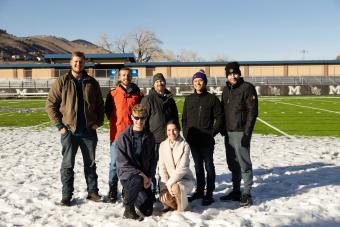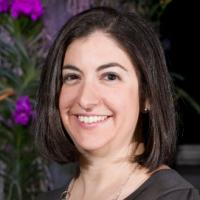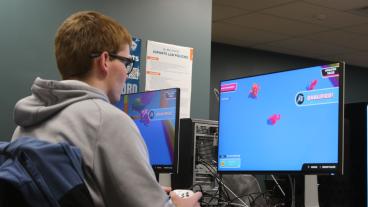Mines team advances to finals in NASA Watts on the Moon Challenge

The Orbital Mining team includes (back row, left to right) Dewey Gazvoda, Daniel Abel, Chris Tolton, Ken Liang, Carsten Nesgaard, (front row, left to right) Zach Thelen and Ashle Jantzen. Except for Nesgaard, all those involved with Orbital Mining are current students at Mines or alumni.
Two Colorado School of Mines graduate students are finalists in NASA’s Watts on the Moon Challenge, a competition to design and create a system to distribute, manage and store energy on the Moon’s surface.
Ken Liang and Chris Tolton, both pursuing an MS in Space Resources, teamed up for the challenge, and of the four finalist teams, they are the only one led entirely by students. They’re also the only team currently running a company in the space resources industry – together they founded Orbital Mining Corporation, a space technology startup focused on lunar power and mining.
“Mining is power intensive,” Liang said. “If you’re going to mine the Moon, you’re going to need a stable power plant. Ultimately, that’s what we’re looking to do, and we think we can get there by the end of the decade.”
The team has already won $600,000 by advancing to the finals, with the funding going into research and development at their company. The winning team will receive another $1 million from NASA, with the second-place team getting $500,000.
Currently, they’re running more tests before submitting a safety review in February 2024. After that, they’ll finish building out their system and continue testing until April, when they’ll drive a prototype out to the NASA Glenn Research Center in Cleveland. There, they’ll put their ideas to a final test in a vacuum chamber. One of the remaining hurdles is figuring out how to keep power going during the approximately two weeks when the Moon is not exposed to the sun.
“We just have to figure out how to survive the lunar night, and once we do that, we’re solid,” Tolton said.
Liang and Tolton met at Mines and quickly discovered they had similar interests in both the space resources industry and entrepreneurship. They also had complementary talents and backgrounds.
“Chris had the big idea and a solid plan of what to do as CEO and I thought that would be great to pair with my engineering experience,” Liang said. “Then we soon found out about Watts on the Moon about two or three weeks before the application was due. It was fortunate we met when we did.”
The team attributes much of their success so far in the competition to their partnerships. With support from Zekalabs, a power conversion company based in Bulgaria, they’ve been able to get their ideas off the ground faster and more efficiently than they would have otherwise. Having support from other students and the faculty at Mines to consult on different aspects of the challenge and on starting Orbital Mining Corporation has also been valuable.
“Professor of Practice Chris Dreyer and Teaching Assistant Professor Polina Ringler have been so valuable with help on the technical stuff, while Sid Saleh, director of McNeil Center for Entrepreneurship and Innovation, has been great in assisting with the entrepreneurship side and making our ideas into a business,” Tolton said. “From where we started in the Innov8x class until now is amazing.”
Both also credit being based in the Denver area as crucial to their success so far and into the future. Between Mines’ Space Resources program, Colorado’s existing aerospace industry and the National Renewable Energy Laboratory, there’s a strong talent pool they can draw from to grow Orbital Mining.
“We’re in the right place to set up shop for a power company on the Moon,” Liang said. “You don’t usually get this perfect mix of disciplines working together. With a lot of commercial start-ups based here, Denver has become like the Silicon Valley for space. Technology we haven’t even heard of yet is going to come out of here.”
And even if they come up short in the Watts on the Moon Challenge, Tolton and Liang still have their sights set high.
“We want to be the power provider on the Moon,” Tolton said. “Watts on the Moon is one piece, but we’re working on research and development in other departments so when NASA releases contracts, we’ll have a company that’s ready to provide those services.”




